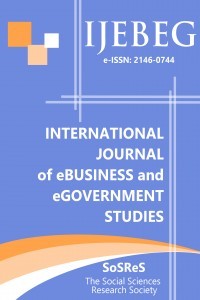GLOBAL PRODUCTION NETWORKS and KNOWLEDGE TRANSFER MECHANISIMS
GLOBAL PRODUCTION NETWORKS and KNOWLEDGE TRANSFER MECHANISIMS
This paper aims to examine existing knowledge transfer mechanisims in global production networks within the changing pattern of international trade and industrial upgrading process in several sectors from 1990s to present. East Asian countries constitute the essential interest field of the study. This paper discusses the role of Multinational Companies, advantages of attendance to GPNs, especially in terms of knowledge diffusion and its contributions to local capability creation and how can developing countries get far within these paradigms.Altough developments in the field of information and communication technologies has made access and transfer of information and data(mostly codified knowledge) fundamentally easier since 1990s, it remains limited for some knowledge types which involves a certain degree of tacitness.In this paper,different tacit knowledge types will also be discussed and GPN will be taken as an effective knowledge sharing platform where knowledge management practices of MNCs play a key role on knowledge diffusion
Keywords:
GPN, MNC knowledge diffusion, tacit knowledge,
___
- Abramovitz, M.(1986).”Catching up, Forging Ahead, Falling Behind” Journal of Economic History,46(2),385-406
- Andersen PH, Christensen PR (2005) “Bridges over troubled waters: suppliers as connective nodes in global supply Networks”. Research58:1261–1273. Journal of Business
- Borrus, M., D. Ernst, and S. Haggard (2000), eds., International Production
- Networks in Asia. Rivalry or Riches?, Routledge, London Cohen, W.M., Lavinthal, D.A., 1990. Absorptive capacity: a new perspective on learning and innovation. Administrative Science Quarterly 35, 128–152.
- Coe,N.M.,Dicken,P. and Hess,M.(2008)” Global production networks: realizing the potential” Journal of Economic Geography 8 (2008) pp. 271–295 Advance
- Access Published on 29 February 2008
- Davenport ,T. H., Prusak, L. (1998) “ Working Knowledge,”How Organizations
- Manage What They Know , Harvard Business School Press Dicken, P. (2003c) ‘Placing’ firms: grounding the debate on the ‘global’ corporation. In J. A. Peck and H. W.-C. Yeung (eds) Remaking the Global
- Economy: Economic -Geographical Perspectives. London: Sage Publications, 27– Dicken, P. (2007) Global Shift: Mapping the Changing Contours of the World
- Economy, 5th edn. London: Sage; New York: Guilford. Ernst, D. and L. Kim (2002), “Global production networks, knowledge diffusion and local capability formation”, Research Policy, 34, 1417-1429.
- Gereffi, G. (1999), “International trade and industrial upgrading in the apparel commodity chain”, Journal of International Economics, 48, 37-70.
- Gupta, A.K. and GOVINDARAJAN, V(2000)”Knowledge Flows Within
- Multinational Corporations” Strategic Management Journal Strat. Mgmt. J., 21: –496 Haron, H. (2005) Conceptualization of Tacit Knowledge Dimension,Proceedings of the Postgraduate Annual Research Seminar,Universiti Teknologi Malaysia
- Humprey, J. (2004), Upgrading in global value chains, International Labor
- Organization, Working Paper No. 28, Geneva. Lall, S., M. Albaladejo and J. Zhang (2004), “Mapping fragmentation: Electronics and automobiles in East Asia and Latin America”, Oxford Development Studies, , 407-432
- Mikler, J. J. (2007) Varieties of capitalism and the auto industry’s environmental initiatives:national institutional explanations for firms’ motivations. Business and Politics, 9. Available online at http://www.bepress.com/bap/vol9/iss1/art4.
- Nonaka, I. 1991. The Knowledge-Creating Company. Harvard Business Review,
- November–December, pp. 96–104. Nonaka, I., Takeuchi, H., 1995. The Knowledge Creating Company: How
- Japanese Companies Creates the Dynamics of Innovation.Oxford University Press,New York. Xiaobo Wu Guannan Xu Zhenzhen Pei, Factors of Knowledge Transfer in Global Production, Network: In View of a Developing Country, , School of management, Zhejiang University, Hangzhou 310058, P.R. China
- Ernst, D. , Fagerberg, J. and Hildrum J.(2001) Do Global Production Networks and Digital Information Systems make Knowledge spatially Fluid?
- Polanyi, M. (1962) Personal Knowledge: Towards a Post-Critical Philosophy.
- University of Chicago Press, Chicago Stiglitz, J.E. (1999) “Knowledge as a Global Public Good”,UNDP.
- Başlangıç: 2009
- Yayıncı: Sosyal Bilimler Araştırmaları Derneği
Sayıdaki Diğer Makaleler
TACIT KNOWLEDGE EXTRACTION FOR SOFTWARE REQUIREMENT SPECIFICATION
Serbülent ÜNSAL, Meryem AYAS, Tunc Durmuş MEDENİ
Muhajir Kachwamba, Iddi Makombe
REFERENDUMS AND E-VOTING IN TURKEY
Rabia Bahar ÜSTE, Berrin GÜZEL
Ahmet Ozturk, Koray Umit, Ihsan Tolga Medeni, Burak Ucuncu, Meryem Caylan, Firat Akba, Tunc Durmus Medeni
ELECTRONIC PARTICIPATION IN THE POLICY MAKING PROCESS: A CASE STUDY
Kamil Demirhan, M. Kemal Öktem
Karim AL-YAFI, Habin LEE, Afshin MANSOURI
THE MANAGEMENT'S ROLE IN THE SUCCESS OF THE INTRODUCTION OF MANAGEMENT INFORMATION SYSTEMS
Krisztián Kisari, József Csernák, Zoltán Zörög, István Takács
APPLYING MOBILE TECHNOLOGIES FOR PERSONNEL RECRUITING –AN ANALYSIS OF USER-SIDED ACCEPTANCE FACTORS
